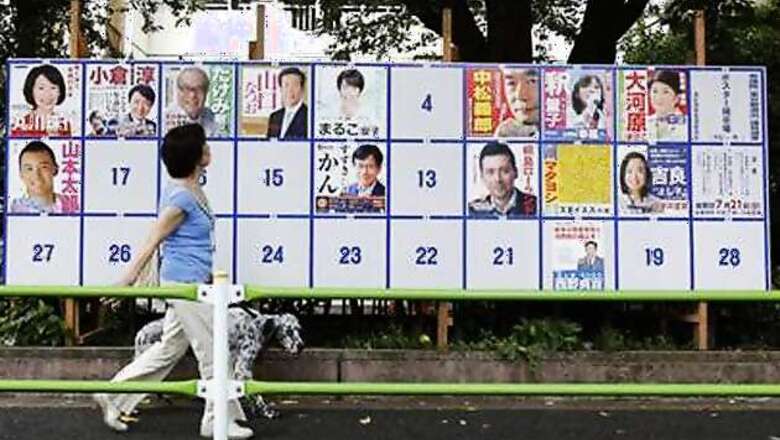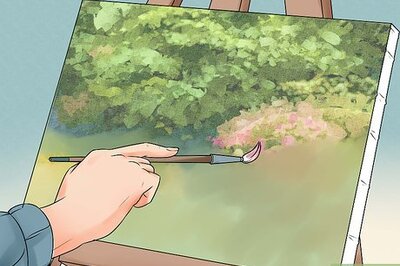
views
Japanese Prime Minister Shinzo Abe's ruling bloc won a decisive election victory on Sunday, cementing his grip on power but raising the possibility he could lose interest in difficult economic reform and shift focus to his nationalist agenda instead.
The win in the election for parliament's upper house gives the hawkish Abe a stronger mandate for his "Abenomics" recipe to revive the economy and sets the stage for the first stable government since popular Junichiro Koizumi left office in 2006.
But it also raises concern about him keeping his victorious party in line.
"The outcome of this election shows that the public wants politics that can make decisions and (a government) that can push forward policies," Abe told NHK public television.
The win spells a personal political redemption for Abe, who led his Liberal Democratic Party (LDP) to a humiliating defeat in a 2007 upper house poll in his first term as premier.
The ensuing parliamentary deadlock allowed the opposition to block legislation and led to Abe's resignation two months later. That "twisted parliament" has hampered policies for most of the six years since and led to a string of revolving-door leaders.
Abe, 58, who returned to power after a big win in December's lower house poll for his LDP and coalition partner New Komeito, reiterated that he would remain focused on fixing the economy with a mix of hyper-easy monetary policy, fiscal spending and a growth strategy including structural reforms.
"We've argued that our economic policies aren't mistaken, and the public gave us their support. People now want to feel the benefits. The economy indeed is improving," Abe said.
"We'd like to do our best to generate a positive cycle - in which job conditions improve and wages rise, boosting personal consumption and prompt companies to invest more - as soon as possible."
But concerns have already surfaced that the size of the LDP-led bloc's victory will weaken Abe's resolve for economic reform in the face of opposition to deregulation from LDP lawmakers with close ties to industries that would suffer from change.
"So far, Abe's opponents were opposition parties. But from now on, he might find himself having to fight with people within his own party," said Tomoaki Iwai, a political science professor at Nihon University in Tokyo.
"It is too early to tell if he can maintain his leadership as he did so far."
Critics also worry Abe will shift focus to the conservative agenda that has long been central to his ideology, and concentrate on revising the post-war pacifist constitution and recasting Tokyo's wartime history with a less apologetic tone.
Such a shift, along with moves to strengthen Japan's defense posture, would further fray ties with China and South Korea, where bitter memories of Japan's past militarism run deep. Tokyo is already engaged in tense territorial rows with Beijing and Seoul over tiny, uninhabited islands.
"One big question is how PM Abe wants to use this power he now has. Will he continue to focus on an economic agenda, or will be try to use the advantage on his pet projects like changing the constitution," said Takuji Okubo, chief economist at Japan Macro Advisors in Tokyo.
"Some people think, now that Abe has this very firm majority, both upper house and lower house, he might actually divert away from an economic agenda and spend his political capital on political issues," Okubo added.
OPPOSITION DRUBBING
Abe said more debate was needed to win public understanding on constitutional reform. "I would like to deepen proper debate in a calm and stable situation," he said.
Abe has declined to say whether as premier he will visit Tokyo's Yasukuni Shrine for war dead, where Japanese leaders convicted by an Allied tribunal as war criminals are also honoured. A visit on the August 15 anniversary of Japan's defeat in World War Two would spark outrage in the region.
A Reuters poll showed Japanese firms generally wanted the LDP to win the election but they worry a landslide victory would allow Abe to prioritise nationalist policies over the economy, as critics say he did during his troubled 2006-2007 term.
Media projections showed the LDP and New Komeito would win more than 70 of the 121 seats up for grabs in the 242-seat upper house. With the coalition's uncontested 59 seats, that hands it a hefty majority, solidifying Abe's grip on power and raising the chances of a long-term Japanese leader for the first time since the reformist Koizumi's rare five-year term ended in 2006.
No election for either house of parliament need be held until 2016.
Exit polls showed, however, that the LDP fell short of winning an upper house majority in its own right for the first time since 1989, although it could put in a better performance than in 2001, when the party was led by the popular Koizumi.
The LDP and two smaller parties that back Abe's drive to revise Japan's pacifist constitution to legitimise the military looked to fall short of the two-thirds majority needed to take revisions of the charter to a public referendum, the exit polls showed. Those parties have two-thirds of the lower house seats.
Despite the LDP-led bloc's win, the party's pro-nuclear power stance is unpopular, and plans to restart reactors that have been off-line since the March 2011 Fukushima nuclear disaster could run into trouble.
Abe will also have to decide whether to go ahead with an increase in a 5 percent sales tax to 8 percent next April, the first stage in a planned doubling of the levy to rein in Japan's massive public debt.
Finance Minister Taro Aso told a G20 meeting in Moscow on Saturday the tax increase would be implemented but Abe said he wanted to decide later in the year whether to go ahead.
The main opposition Democratic Party of Japan, which surged to power in 2009 to end more than half a century of almost non-stop LDP rule only to be ousted last year, suffered its biggest drubbing since its founding in 1998. Exits polls showed the party winning 21 or fewer seats.
"Given that this government is getting a big mandate out of what seems to be a low turnout, it's not like there's a popular enthusiasm strongly behind Abe," said Kochi Nakano, a political science professor at Sophia University.
"It's sort of an empty victory that's exaggerated both by the electoral system and because of the low turnout, so we can talk about the crisis of Japanese democracy. It's unhealthy for any parliamentary democracy not to have opposition that would keep the government in check."

















Comments
0 comment